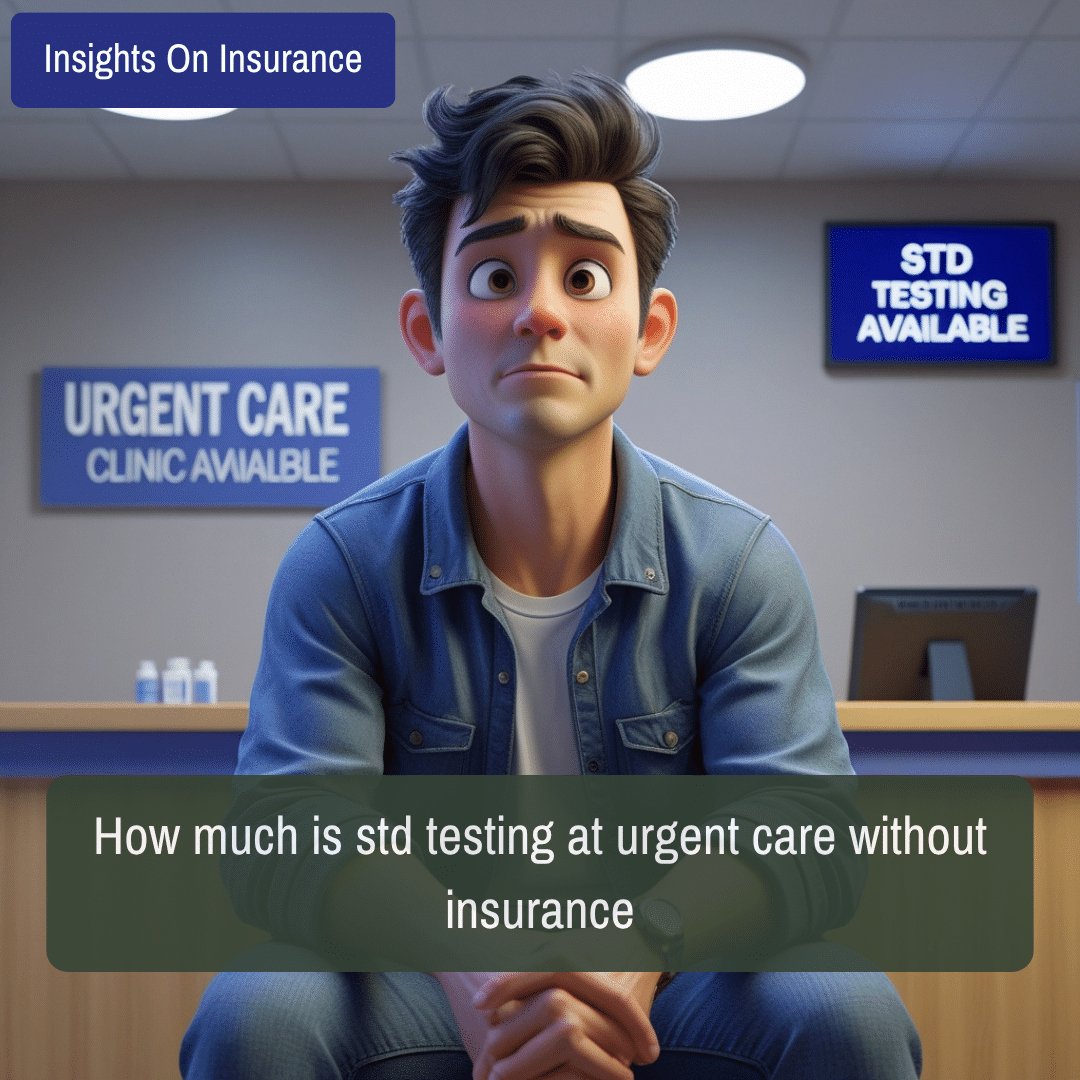When it comes to sexual health, timely testing is essential. But for many people without insurance, one big question stands in the way of taking action: how much is STD testing at urgent care without insurance?
At InsightsOnInsurance, we believe no one should avoid testing due to uncertainty about costs. This guide breaks down what you can expect to pay, what influences pricing, and how to find affordable options without sacrificing privacy or accuracy.
Why STD Testing Matters, Even Without Insurance
Sexually transmitted infections (STIs), commonly referred to as STDs, are far more common than many people realize. The CDC estimates that one in five people in the United States has an STD at any given time. That means routine testing isn’t just for those with symptoms—it’s essential for everyone who is sexually active.
For people without health insurance, however, the fear of high medical costs can discourage testing. Many assume it’s unaffordable and delay care, which can lead to more serious long-term health problems like infertility, organ damage, and increased risk of transmission to others.
What’s more, some STDs remain asymptomatic for long periods, making them difficult to detect without proper screening. This silence makes them more dangerous—and also more urgent to test for.
STD testing is about more than just peace of mind. It’s about responsibility—to yourself and your partners. And thanks to a variety of options, you can access accurate and confidential testing even without insurance.
What Drives the Cost of STD Testing?
STD testing costs vary depending on several key factors. Understanding these can help you make informed, cost-effective decisions:
- Type of tests required: Some infections like chlamydia or gonorrhea require swab tests, while others like HIV require blood samples. Each test adds to your bill.
- Urgent care consultation fees: Most urgent care centers charge a base fee just for seeing a doctor, typically between $80–$120.
- Number of STDs being tested: A full panel covering 6–10 infections can be significantly more expensive than a single test.
- Lab processing fees: Many clinics outsource lab testing, and each lab sets its own prices.
- Geographic location: Urban areas and private clinics may charge more than community-based clinics or rural centers.
Knowing these variables ahead of time allows you to ask the right questions and avoid surprise charges.
STD Testing Costs at Major Urgent Care Clinics
Here’s what some of the most commonly used urgent care centers charge for STD testing without insurance:
- CityMD: Basic STD testing starts at $225. A comprehensive panel can cost over $400 depending on the tests selected.
- Planned Parenthood: Some centers offer income-based pricing. Costs usually range from $130–$250, with some free programs available.
- FastMed Urgent Care: Average self-pay pricing is $199–$299. They often advertise discounted full panel prices.
- Statcare: Offers an STD panel for $179 covering 8 STDs including chlamydia, HIV, and herpes.
It’s important to note that urgent care centers often list a flat consultation fee, but the total price increases with each additional test, lab service, or prescription provided.
Some locations offer bundled testing packages, while others may bill everything separately. Always ask for a breakdown before agreeing to the tests.
The Rise of At-Home STD Testing Kits
With the rise of telehealth and digital health platforms, at-home STD testing kits are gaining popularity. These kits provide convenience, privacy, and cost savings—but how do they compare?
- Everlywell: Priced at $149, includes tests for six common STDs. Offers free shipping and digital results.
- LetsGetChecked: Offers a range of test panels, starting from $99. All results reviewed by a physician with follow-up support.
- STDCheck.com: Offers a 10-test panel for $139 and individual tests from $59.
While not as immediate as urgent care, many people prefer the privacy and convenience of at-home testing. They also help avoid the higher cost of in-person consultations.
Just keep in mind: If you test positive, you may still need to visit a clinic for treatment. Some services offer telehealth prescriptions, but this depends on your location.
How to Find Free or Low-Cost STD Testing Near You
If urgent care and at-home kits are still too costly, here are other ways to access affordable or free testing:
- Local Health Departments: Many city or county health departments offer no-cost STD screening.
- Planned Parenthood: Offers sliding scale fees and sometimes free testing days.
- University Clinics: Students can often access testing through their campus health centers at little or no cost.
- Nonprofit Clinics: Organizations like AIDS Healthcare Foundation (AHF) and others provide low-cost or free testing nationwide.
- Community Health Events: Look out for testing campaigns during STD Awareness Month or World AIDS Day.
Call ahead or check their websites to confirm eligibility, hours, and required documentation.
FAQs: STD Testing at Urgent Care Without Insurance
Is STD testing at urgent care confidential?
Yes. All medical services, including STD testing, are protected by HIPAA and privacy laws.
How fast can I get results?
Most urgent care centers provide results within 1–5 business days. Some offer rapid testing for HIV and syphilis.
Do I need symptoms to get tested?
No. Many STDs don’t show symptoms. Regular screening is recommended, especially if you’ve had unprotected sex or new partners.
Can I get tested anonymously?
At-home kits provide the most anonymity. Urgent care centers may require ID for services.
What’s included in a standard STD panel?
Most panels include chlamydia, gonorrhea, syphilis, HIV, herpes, and hepatitis B/C. Always confirm what’s being tested.
Is treatment included in the cost?
Not always. Some clinics charge extra for prescriptions or follow-up visits. Ask upfront about total fees.
